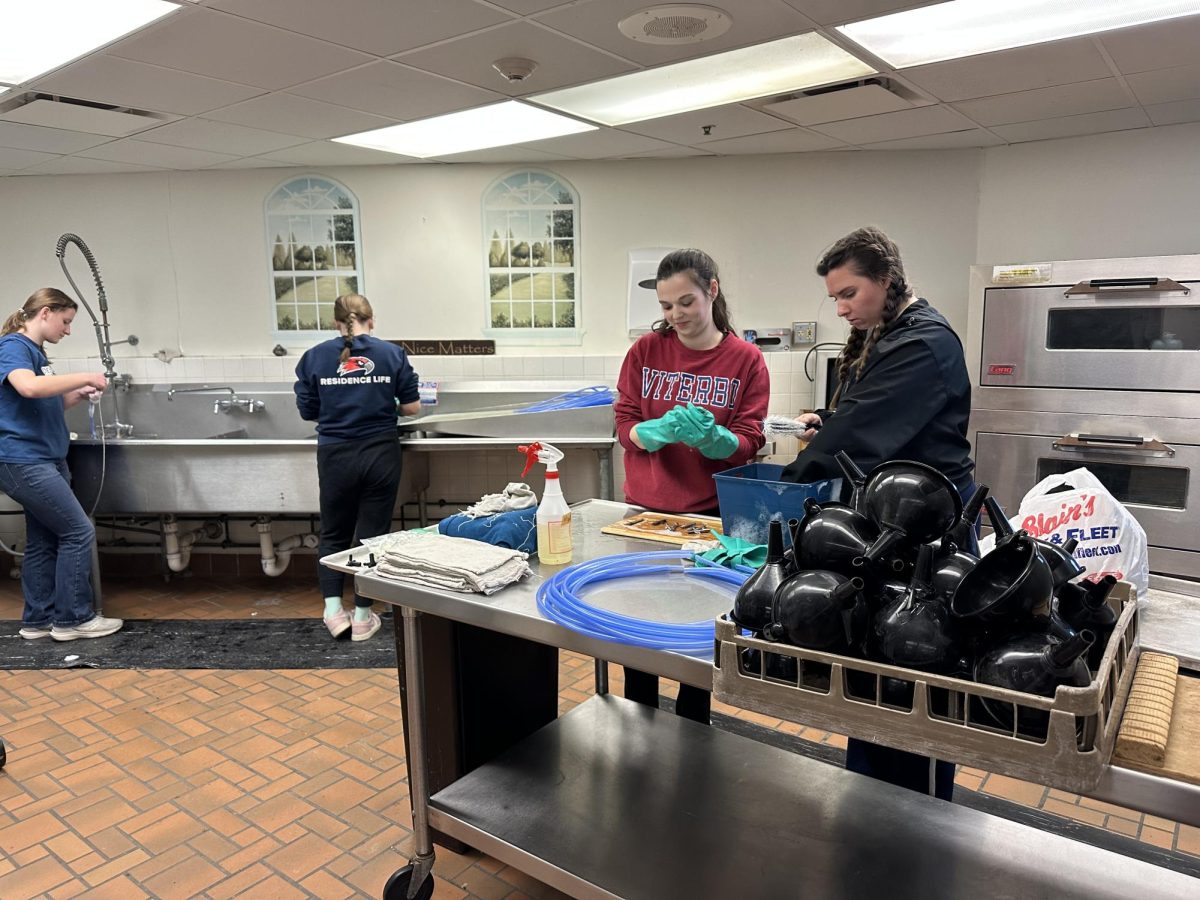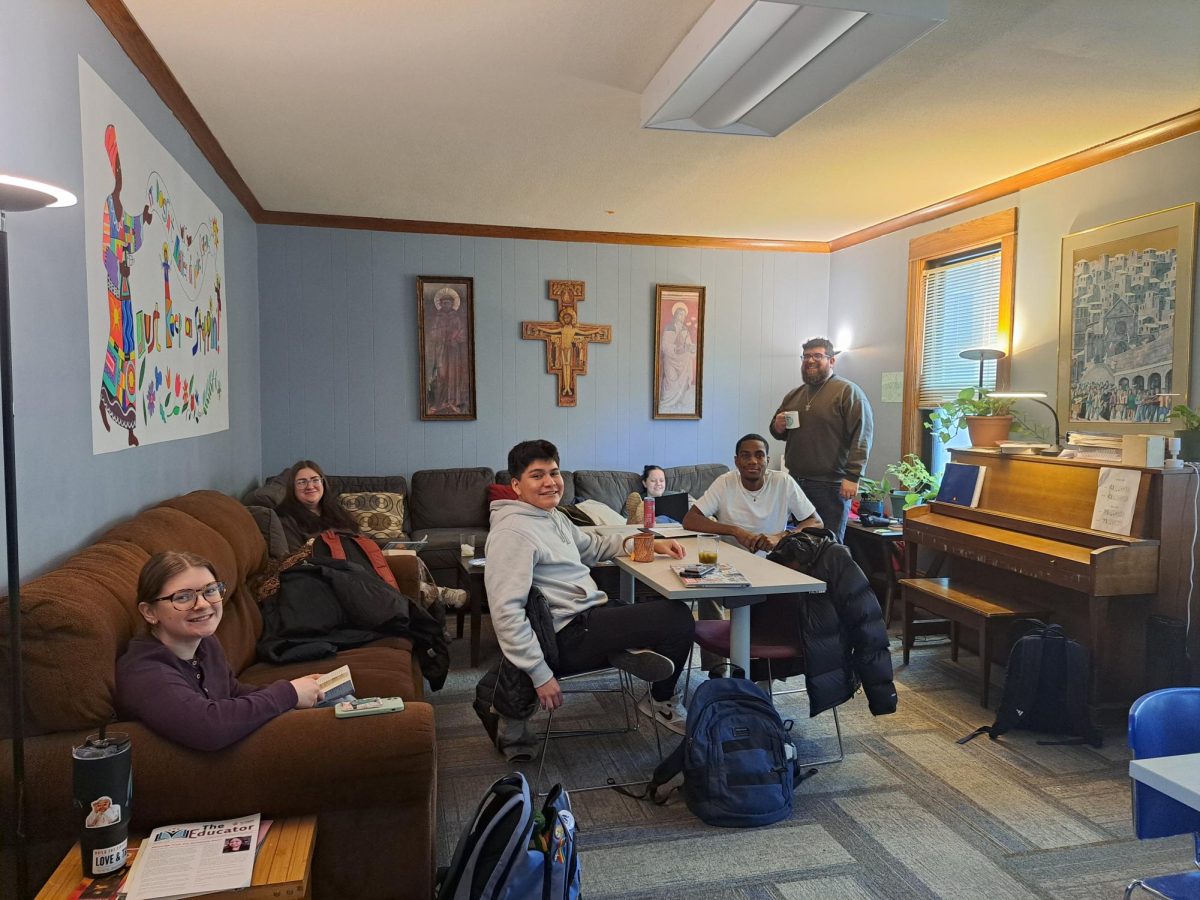One man, five decades, and countless voices: Prof. Emeritus Dan Johnson-Wilmot reflects
November 8, 2021
This year, as the university’s Fine Arts Center celebrates 50 years of existence, one of its longest-running residents is celebrating an anniversary of his own. Daniel Johnson-Wilmot—Professor Emeritus, voice instructor, and former Music Department chair—is approaching his 49th full year at Viterbo. From his first steps in the Fine Arts Center for a 1972 recital to his solo performance at the celebratory gala this past month, the now “retired” faculty member has performed his share of music on both sides of the conductor’s stand. This past week, he sat down with the Lumen to share his story, memories, and gratitude.
Johnson-Wilmot’s roots in music began early on. “I liked to sing when I was young; [it began] when my family started attending the local Catholic church,” he explained. “I sang the old Catholic mass parts in Latin.” The vocal proficiency he began to develop at that time went unnoticed until his senior year of high school, when he got the main role in the school musical, “The Boy Friend.” Despite this success, he decided to pursue a major in government at St. John’s University after leaving high school in Duluth. “I was going to become a lawyer,” he commented.
Upon his entrance to the university, Johnson-Wilmot also auditioned for the St. John’s Men’s Chorus, directed by a man who would become one of his first mentors: Gerhard Track, a renowned and serious director of Austrian roots. After earning himself one of the two open spots in the baritone section, one of the many unforgettable musical moments in his life took place. “When one of the soloists got sick, Gerhard looked at me suddenly [during rehearsal] and said with his pronounced Austrian accent, ‘Chonson, sing za solo.’ When I was done, the choir applauded me, which never happened—the choir had a hierarchical structure, and the attitude was…you were lucky just to get in.”
With this inspirational moment to build his confidence, Johnson-Wilmot went on to further his studies in music. “Sister Mary Helene was my first voice teacher, in undergrad, and she was one of my mentors,” he noted. “I graduated with a Bachelor of Arts in Music and a minor in Education…and I had two choices. I could go teach…in Minnesota…or go live in Austria for a year…and I chose Austria. There, I served as a prefect in the monastery at Melk. [I started] my first boy-choir there…with 20 boys.”
After a year there, he returned to Wisconsin as a young professional to attend graduate school at the University of Wisconsin-Madison. It was at that time he met Sister Anna Mae Borja, who would become one of his close friends. “She was the one who told me to apply [for the Viterbo job], he explained. “She said, ‘They are looking for a new male voice teacher and you have to be that teacher.’”
When he arrived for his audition and interview, he met with the current university president, Father Finucan. At the time of the meeting, Johnson-Wilmot said, “I knew…that the other two candidates were established teachers, so I told Father Finucan, ‘You will not be able to hire anyone who will work more hours for less pay.’” This must have sealed the deal, because in April of 1973, the spring after he completed a summer voice recital in the brand-new Fine Arts Center, he began his career as a professor of voice.
At that time, there were 11 Franciscan Sisters of Perpetual Adoration teaching in the Music Department. He says he treasures his “friendships with the FSPA…Sisters Anna Rose, Marlene, Johanna, Antionette, Lucilda, Beth, Rosella, Ann, Marcella, Carolyn …and Cyrilla Barr—who was chair of the Music Department when I was hired.” Other treasured figures from his past tenure include Charles Lawson, an instrumental faculty member, as well as retired voice faculty Diane Foust, Jerry Benser, and Jean Saladino.
Looking back on 30 years directing the Concert Choir, 30 years with the La Crosse Boy Choir, 8 years as a NATS National Committee member, and travels across the world, Johnson-Wilmot remarks, “It has been such a pleasure to work with so many tremendously talented students for five decades. There are too many memories to count.”
The new Professor Emeritus would like to extend his gratitude to his longstanding present full-time colleagues–Judy Stafslien, Nancy Allen, Mary Ellen Haupert, Ann Schoenecker, David Richardson, and Tim Schorr—as well as new colleagues: Ronnie Bell and James Wilson. Though he is stepping back from full-time teaching, his response to “What will you do with ‘retirement’?” is, “I will continue to teach…as long as I am healthy and continue to learn.”

